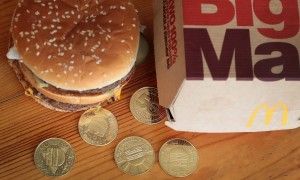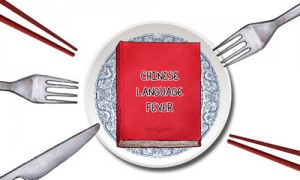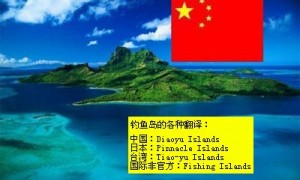特朗普想来一场贸易战吗?抑或他的贸易保护主义言论不过是虚张声势?对许多美国贸易伙伴而言,尤其是欧盟国家,这个答案并不是显而易见的。虽然今天,有一些证据表明不过是吓唬人。

Does Donald Trump want a trade war? Or are his protectionist pronouncements merely bluster? To many of America’s trading partners, particularly the member countries of the European Union, there is no clear answer to this question. Today, though, there’s a bit more evidence favoring the bluster theory.
特朗普想来一场贸易战吗?抑或他的贸易保护主义言论不过是虚张声势?对许多美国贸易伙伴而言,尤其是欧盟国家,这个答案并不是显而易见的。虽然今天,有一些证据表明不过是吓唬人。
On Monday evening, hours before a self-imposed deadline, the White House announced that it would delay, by another thirty days, the imposition of tariffs on steel and aluminum imported from Canada, Mexico, and the European Union.
周一晚间,白宫在自我设定的最后期限到来前几小时,宣布将对加拿大、墨西哥和欧盟钢铝商品征收关税再推迟三十天。
Evidently, this was a concession to the trade doves inside the Administration—including Steve Mnuchin, the Treasury Secretary, and Larry Kudlow, the new head of the National Economic Council—who want more time for negotiations with other countries to play out. But there is no assurance that more time will yield any breakthroughs—in part because the Administration’s policy was incoherent to begin with, and isn’t much clearer now.
显然这是向特朗普政府内部的贸易鸽派做出了让步,这些鸽派包括财长史蒂夫.姆钦、国家经济委员会新主任拉里.库德洛,他们为其他国家争取更多时间进行谈判。但并不保证有了时间就会有突破,部分原因是本届政府的政策一开始就不合逻辑,现在也一团糊涂。
Ostensibly, the dispute revolves around China dumping its excess steel production on world markets and depressing prices, which leads to problems for American steel producers and American steel workers.
表面上看,争端关键是中国向世界市场倾销过剩钢产品,压低价格,这给美国钢厂和钢厂工人带来麻烦。
During the past couple of decades, China has built a huge steel industry that now produces more than ten times as much output as the U.S. steel industry does. Rather than focussing on Chinese producers alone, however, the White House announced on March 1st that the new import levies—twenty-five per cent on steel and ten per cent on aluminum—would apply to all of America’s trading partners, including close allies such as Canada and the E.U.
过去几十年,中国建造了巨大的钢铁产业,现在起产量是美国钢产业的十倍还多。可白宫不仅瞄上了中国制造商,3月1日还宣布25%的新钢铝进口关税还要向美国所有贸易伙伴征收,包括加拿大和欧盟等亲密盟友。
The trade hawks in the Administration, who include Robert Lighthizer, the U.S Trade Representative, and Wilbur Ross, the Commerce Secretary, argued that this blanket approach was necessary to prevent China from shipping steel and aluminum to the United States via third countries.
包括美国贸易代表罗伯特.莱特希泽和商务部长威尔伯.罗斯在内的政府内贸易鹰派认为,这种一视同仁的政策对阻止中国通过第三国将钢铝运到美国来是必要的。
But to the Europeans, in particular, the White House’s move looked like the beginning of a broader campaign to eliminate the U.S. trade deficit by targeting a broad range of U.S. imports and promoting U.S. exports. After all, this was the aim that Donald Trump had set out in speeches and tweets ever since the start of his Presidential campaign.
但尤其对欧洲人而言,白宫的举动看起来像是更大规模行动的开端,旨在通过针对更多的进口商品并推动美国出口来消除美国赤字。毕竟,这正是特朗普自竞选以来在演讲和推文中提到的目标。
The Administration continues to send mixed signals on this point. On Friday, after meeting with Angela Merkel, the German Chancellor, at the White House, Trump brought up the U.S. steel industry, saying its success was vital to national security.
在这一点上,特朗普政府的信号前后不一。周五,特朗普在白宫会晤德国总理安格拉.默克尔后,又提到美国钢产业,说钢产业的成败关乎国家安全。
But he also talked about the U.S. trade deficit in goods with the E.U., which was $151.4 billion last year, saying he was committed to “remedy these trade balances.” (If services are included, the deficit falls below a hundred billion.) Trump singled out the auto industry, seemingly oblivious to the fact that General Motors and Ford have for many decades maintained extensive manufacturing operations in Europe, and, since the nineteen-nineties, BMW and Mercedes-Benz have had plants in the United States.
但他也说到美国对欧盟的货物贸易赤字,去年是1514亿美元,他说将致力于“恢复贸易平衡”。(如果包含服务业在内,赤字不足1000亿美元。)特朗普拎出汽车来,好像忘了几十年来,通用汽车和福特一直在欧洲进行了广泛的制造活动;自上世纪九十年代以来,宝马和奔驰也在美国建厂。
Over the weekend, Merkel, French President Emmanuel Macron, and British Prime Minister Theresa May spoke by telephone, and Merkel later issued a statement saying that Europe was “resolved to defend its interests”—this was a signal that they wouldn’t be pushed around by Trump.
周末,默克尔、法国总统马克龙和英国首相特蕾莎.梅通了电话,随后默克尔发表声明说,欧洲“决心捍卫其利益”,这发出了信号,即他们不会让特朗普摆布。
The E.U. has already drawn up a list of retaliatory tariffs—targeted at iconic U.S. goods, such as bourbon and Harley-Davidson motorcycles—that it would put in place if the White House goes ahead with its steel and aluminum plans.
欧盟已经拉出了报复清单,针对标志性的美国产品,如波旁威士忌和哈雷摩托,如果白宫一意孤行推动钢铝关税计划,这些报复行动就会推行。
The Trump Administration reportedly wants the Europeans to agree to a numerical cap on their steel exports, as South Korea has done, as well as other measures designed to enhance access to the European market for American firms. But the Europeans are resisting these proposals.
据报道,特朗普政府想要欧洲人统一对钢出口设限,韩国就是这样做的,他还希望欧盟采取其他旨在改善美国公司准入欧洲市场限制的措施。但欧洲人拒绝了这些提议。
On Tuesday, the European Commission issued a statement that said, “as a longstanding partner and friend of the U.S., we will not negotiate under threat. Any future transatlantic work program has to be balanced and mutually beneficial.”
周二,欧洲委员会发表声明称,“作为美国长期的伙伴和朋友,我们不会在威胁下进行谈判。未来任何跨大西洋的工作项目必须是平等互利的。”
An irony here is that many influential people in the E.U. share some of the Trump Administration’s concerns about Chinese mercantilism. European business leaders and politicians are just as worried as their American counterparts about China subsidizing its own industries, discriminating against foreign companies, and exploiting technology developed abroad.
讽刺的是,欧盟许多有头有脸的人同意特朗普政府对中国重商主义的忧虑。欧洲商界领导人和政客和美国同行一样担心中国对本国产业进行补贴,歧视外国公司并榨取国外开发的技术。
Last year, the European Union Chamber of Commerce issued a report criticizing Beijing’s “Made in China 2025” plan, which targets key industries of the future, such as green energy, artificial intelligence, and robotics. And the E.U. has joined the U.S. government in a dispute at the World Trade Organization, the international trade regulator, over whether China should be designated as a “market economy.”
去年,欧盟商会发布报告批评了中国政府的《中国制造2025》计划,这一计划瞄准未来重要产业,如绿色能源、人工智能和机器人等。欧盟和美国政府一道在世贸组织抗议中国被认定为“市场经济国家”。
A different U.S. President might have sought to create a united transatlantic effort to exert more pressure on Beijing. But, of course, Trump is an avowed unilateralist, and his trade advisers have equally little faith in multilateral institutions like the W.T.O. and the E.U. So the U.S. is going it alone against China.
如果是另一个美国总统,他可能会创立一个跨大西洋阵线,共同对北京施压。可当然,特朗普是个公然的单边主义者,他的贸易顾问们也不信任世贸组织和欧盟等多边组织。美国要独自和中国对抗。
In March, the U.S. Trade Representative issued a report accusing China of employing unfair trade practices related to intellectual property and technology transfers.
3月,美国贸易代表署发报告指责中国在知识产权和技术转让方面采用不公平贸易行为。
A few weeks later, the White House said it intended to impose tariffs of twenty-five per cent on more than a thousand Chinese goods, affecting about $46.2 billion of U.S. imports.
几周后,白宫表示准备对一千多种中国商品征收25%的关税,涉及462亿美元进口商品。
Shortly after that, China announced it would impose retaliatory tariffs of a similar scale on U.S. goods exported to China, including soybeans, aircraft, and autos. That Chinese move prompted another escalation from Trump, who threatened to impose an additional hundred billion dollars’ worth of levies on Chinese goods.
很快,中国宣布会对美国出口中国商品征收同等规模的报复性关税,包括大豆、飞机和汽车。中国的报复招致特朗普的行动升级,特朗普威胁要对1000亿美元中国商品征收额外关税。
Unlike the tariffs on Chinese steel, which are already in place, none of these measures have yet gone into effect. Later this week, a U.S. trade delegation that includes Mnuchin and Kudlow, as well as Lighthizer and Peter Navarro—another noted hawk—will travel to Beijing for talks with the Chinese.
同已经对华实施的钢铝关税不同,这些措施都没有实施。本周下半段,包括姆钦和库德洛和莱特希泽和另一个鹰牌彼得.纳瓦罗在内的一个美国贸易代表团将去北京与中国人谈判。
But, according to reports from Beijing, they are unlikely to be offered much in the way of concessions. A senior Chinese official told the Times that “Beijing is unwilling to negotiate with the United States on any curbs on Made in China 2025 .?.?. China perceives the American demands as an attempt to stop China’s economic development and technological progress.”
但根据北京的消息,他们不可能做出太大让步。一位中国高官对《纽约时报》说,“北京不愿意就限制《中国制造2025》与美国人进行谈判……中国认为美国的要求试图阻止中国经济发展和技术进步”。
The immediate question is how Trump will react if China doesn’t accede to U.S. demands. On Wall Street, the consensus is that he will blink again, as he did Monday night. The midterms are approaching, and the imposition of broad tariffs would hurt Republican voters in many farm states. Economists at Goldman Sachs recently predicted that the White House would delay “a final decision on tariffs for several months.”
如果中国不答应美国的要求,特朗普该怎么办,这是紧要的问题。华尔街的人普遍同意他没脾气,就像周一晚上那样。中期选举将近,大幅征收关税会伤害共和党在农业州的选民。高盛经济学家最近预测,白宫会将对“关税的最终决定”推迟几个月。
Many believe that Trump is basically bluffing. But you can never be quite sure. As Chad Bown, a senior fellow at the Peterson Institute, noted, what Trump has done “is make everything uncertain in trade policy. You don’t know on almost a day-to-day basis what trade policy is going to be.”
很多人相信,特朗普基本就是咋呼。但你也别太肯定。正如彼得森研究所查德.波恩所言,特朗普做的事“让一切贸易政策都不确定,你几乎连每天贸易政策要怎么变都拿不准”。







